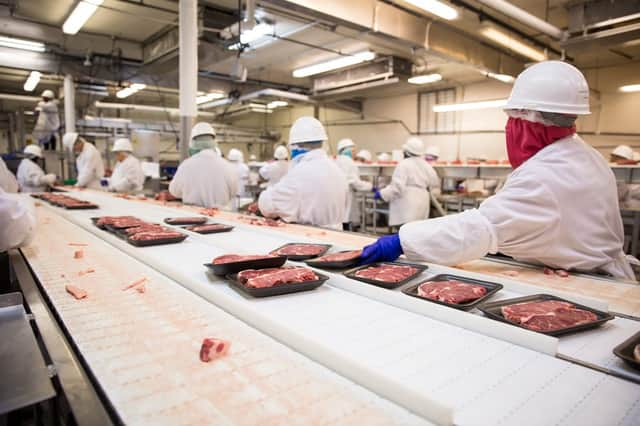Coronavirus outbreaks are appearing in meat processing factories - is the meat safe to eat?


Though Europe has seen a fall in coronavirus cases in recent weeks, new clusters are beginning to emerge - many of them in meat processing factories.
Countries around the world, including France, Germany and the US, have recorded outbreaks stemming from meat processing plants. In the latter, up to 25,000 meat and poultry workers are reported to have contracted coronavirus.
Which UK factories are affected?
Advertisement
Hide AdAdvertisement
Hide AdIn the UK, three large food factories have closed in England and Wales after around 250 workers tested positive for coronavirus. Unite union said it was aware of further suspected outbreaks at five other UK sites.
At least 38 staff have tested positive at Rowan Foods in Wrexham, a site which makes food for UK supermarkets.
On Thursday, June 18, 2 Sisters Food Group announced it would be closing its Anglesey plant for two weeks after 58 people tested positive. The total number of infections is now reported to have reached 158.
The Kober plant, a meat processing site owned by Asda in West Yorkshire, became the third plant to confirm a new cluster of infections after around 150 workers became ill.
Advertisement
Hide AdAdvertisement
Hide AdThe plant has now closed and a test-and-trace programme is reportedly underway.
Why are infections emerging at meat processing factories?
Research from the London School of Hygiene and Tropical Medicine (LSHTM) has shown that after workers' dormitories and ships, food processing factories have been responsible for the largest localised outbreaks of coronavirus.
According to an investigation by the Centers for Disease Control and Prevention (CDC), there are several reasons why these sites create an ideal environment for coronavirus to spread.
One of the first factors at play is that working practices within meat and food processing factories make it hard for employees to properly socially distance - especially on production lines.
Advertisement
Hide AdAdvertisement
Hide AdWorking on a production line also demands speed, something which Professor James Wood, researcher in infection dynamics and control of diseases at the University of Cambridge, believes could make infection more likely:
“If we do see outbreaks in slaughterhouses, one issue could be the challenges of avoiding close working between individuals on fast moving slaughterlines and the substantial air movement that exists in and across many slaughterhouses and meat plants," he told the Telegraph.
Break rooms are also reportedly difficult to socially distance in, and in response, some plants have set up outdoor resting areas.
The physical demands of work in a factory make it difficult to wear face coverings, and CDC observers noted that in the factories they visited, workers tended to cover just their mouths - making masks ineffective.
Advertisement
Hide AdAdvertisement
Hide AdFactories are also noisy, meaning that people have to be shout to be heard, or stand close to each other - both making transmission of coronavirus more likely through the projection of virus particles.
Employees frequently travel to work together, further enabling the spread of the virus. Socio-economic factors are also in play, as factory workers are more likely to live in overcrowded, multi-generational households.
Because these workers are also often on insecure contracts, they may be less likely to take sick leave if they do become ill, creating a situation where they may come to work even if infected.
One of the largest factors at play, however, is the temperature inside meat processing factories - which has to be low in order to keep meat fresh.
Advertisement
Hide AdAdvertisement
Hide AdCalum Semple, professor of child health and outbreak medicine at the University of Liverpool, told the Telegraph:
“If I wanted to preserve a virus I would put it in a cold, dark environment or a cool environment that doesn’t have any ultraviolet light – essentially a fridge or a meat processing facility".
Is it safe to eat meat from affected factories?
Heat is known to kill coronavirus, so the risk of eating meat from an affected factory is generally low - so long as you cook it to the correct minimum temperature.
The World Health Organization (WHO) has reported that heating at 56°C for 15 minutes substantially reduces the infectivity of the virus, so any meat cooked at the recommended temperature should not have any viable trace of the virus left by the time you eat it.
Advertisement
Hide AdAdvertisement
Hide AdAngela L. Rasmussen, PhD, a virologist in the faculty of the Center for Infection and Immunity at the Columbia Mailman School of Public Health told Forbes Magazine that “meat is probably not a big risk", adding that “there is no evidence of food borne transmission".
Though there is evidence that coronavirus can live on packaging, Rasmussen told Forbes that the time between the packaging of the meat at the factory and the customer buying it makes it unlikely that the virus will spread through contact with packaging.
She also added that increased hand hygiene makes it even less likely that contact with packaging could be a source of infection.